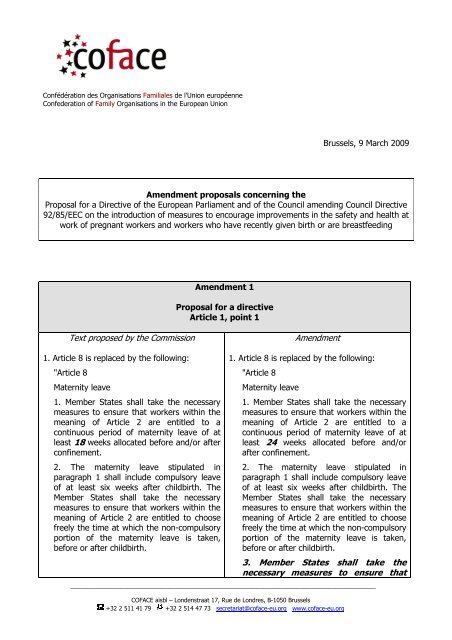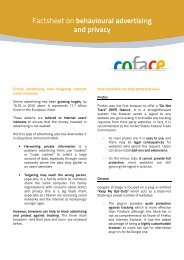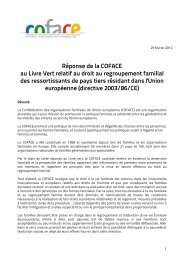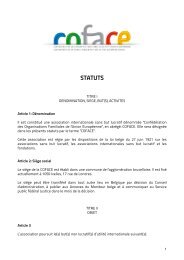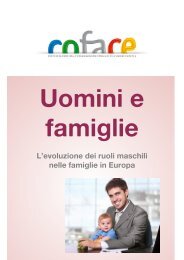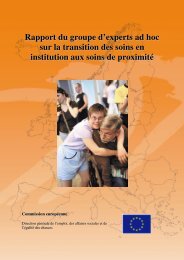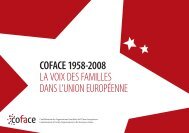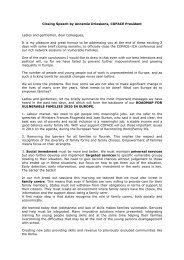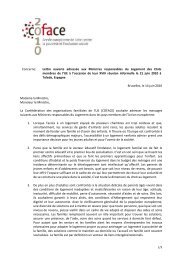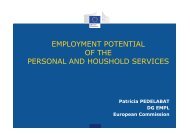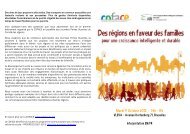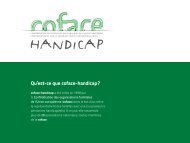Amendment proposals Maternity Leave - COFACE
Amendment proposals Maternity Leave - COFACE
Amendment proposals Maternity Leave - COFACE
Create successful ePaper yourself
Turn your PDF publications into a flip-book with our unique Google optimized e-Paper software.
Confédération des Organisations Familiales de l’Union européenne<br />
Confederation of Family Organisations in the European Union<br />
Brussels, 9 March 2009<br />
<strong>Amendment</strong> <strong>proposals</strong> concerning the<br />
Proposal for a Directive of the European Parliament and of the Council amending Council Directive<br />
92/85/EEC on the introduction of measures to encourage improvements in the safety and health at<br />
work of pregnant workers and workers who have recently given birth or are breastfeeding<br />
<strong>Amendment</strong> 1<br />
Proposal for a directive<br />
Article 1, point 1<br />
Text proposed by the Commission<br />
<strong>Amendment</strong><br />
1. Article 8 is replaced by the following:<br />
"Article 8<br />
<strong>Maternity</strong> leave<br />
1. Member States shall take the necessary<br />
measures to ensure that workers within the<br />
meaning of Article 2 are entitled to a<br />
continuous period of maternity leave of at<br />
least 18 weeks allocated before and/or after<br />
confinement.<br />
2. The maternity leave stipulated in<br />
paragraph 1 shall include compulsory leave<br />
of at least six weeks after childbirth. The<br />
Member States shall take the necessary<br />
measures to ensure that workers within the<br />
meaning of Article 2 are entitled to choose<br />
freely the time at which the non-compulsory<br />
portion of the maternity leave is taken,<br />
before or after childbirth.<br />
1. Article 8 is replaced by the following:<br />
"Article 8<br />
<strong>Maternity</strong> leave<br />
1. Member States shall take the necessary<br />
measures to ensure that workers within the<br />
meaning of Article 2 are entitled to a<br />
continuous period of maternity leave of at<br />
least 24 weeks allocated before and/or<br />
after confinement.<br />
2. The maternity leave stipulated in<br />
paragraph 1 shall include compulsory leave<br />
of at least six weeks after childbirth. The<br />
Member States shall take the necessary<br />
measures to ensure that workers within the<br />
meaning of Article 2 are entitled to choose<br />
freely the time at which the non-compulsory<br />
portion of the maternity leave is taken,<br />
before or after childbirth.<br />
3. Member States shall take the<br />
necessary measures to ensure that<br />
____________________________________________________________________________________________<br />
<strong>COFACE</strong> aisbl – Londenstraat 17, Rue de Londres, B-1050 Brussels<br />
+32 2 511 41 79 +32 2 514 47 73 secretariat@coface-eu.org www.coface-eu.org
3. The prenatal portion of maternity leave<br />
shall be extended by any period elapsing<br />
between the presumed date and the actual<br />
date of childbirth, without the remaining<br />
portion of leave being reduced.<br />
4. Member States shall take the necessary<br />
measures to ensure that additional leave is<br />
granted in the case of premature childbirth,<br />
children hospitalised at birth, children with<br />
disabilities and multiple births. The duration<br />
of the additional leave should be<br />
proportionate and allow the special needs of<br />
the mother and the child/children to be<br />
accommodated.<br />
5. Member States shall ensure that any<br />
period of sick leave due to illness or<br />
complications arising out of pregnancy<br />
occurring four weeks or more before<br />
confinement does not impact on the duration<br />
of maternity leave."<br />
workers within the meaning of Article<br />
2 have at all time during the noncompulsory<br />
period of the leave the<br />
reversible choice to resume work<br />
earlier or to use their full leave, and to<br />
take the non-compulsory portion of<br />
the maternity leave on a full time basis<br />
or on a part-time basis without<br />
reduction of the duration of the leave.<br />
Member States may provide for a<br />
notice period no longer than four<br />
weeks.<br />
4. The prenatal portion of maternity leave<br />
shall be extended by any period elapsing<br />
between the presumed date and the actual<br />
date of childbirth, without the remaining<br />
portion of leave being reduced.<br />
5. Member States shall take the necessary<br />
measures to ensure that additional leave is<br />
granted in the case of premature childbirth,<br />
children hospitalised at birth, children with<br />
disabilities, multiple births, and birth<br />
occurring less than 18 months after<br />
the previous birth. The duration of the<br />
additional leave should be proportionate<br />
and allow the special needs of the mother<br />
and the child/children to be accommodated.<br />
6. Member States shall ensure that any<br />
period of sick leave due to illness or<br />
complications arising out of pregnancy<br />
occurring [Delete: four weeks or more]<br />
before confinement does not impact on the<br />
duration of maternity leave."<br />
Justification<br />
Extending the duration of maternity leave up to 24 weeks will improve the health and security of<br />
mothers and children. The World Health Organisation and UNICEF recommend that all babies be<br />
exclusively breastfed for six months (24 weeks).<br />
It will also facilitate the management of human resources in companies. It is easier for businesses<br />
to find a replacement for six months than for a shorter period. In the latter case, companies<br />
would instead opt to burden other employees with additional work. In the current economic crisis,<br />
this provides an opportunity for people to work.<br />
Finally, when most EU countries are failing to respond to the needs for childcare facilities, it<br />
provides enough time for parents to find one. Most countries have missed the targets for much<br />
needed childcare provision – for 33% of children under three – that EU leaders set themselves at<br />
Barcelona in 2002, according to a report issued by the European Commission in October 2008.<br />
A maternity leave scheme offering the reversible choice to resume work earlier or use the full<br />
leave, and to take the non-compulsory period of the leave on a full time basis or a part-time<br />
basis, would allow women who wish to return earlier and smoothly to work to do so. It would<br />
better meet the needs of the workers and would also benefit to employers. The part-time option<br />
should have no negative impact on the duration of the leave which means that there should be a<br />
2
corresponding increase of the length of the period of leave to amount to 24 weeks of full leave. In<br />
order to grant employers some security, these changes of regime could be subject to a notice<br />
period no longer than four weeks.<br />
Similar challenges should mean similar rights. The challenges arising from close births are similar<br />
to those arising in the context of multiple births. Since the Commission proposal grants additional<br />
leave for multiple births, additional leave should be granted for birth occurring less than 18<br />
months after the previous one.<br />
The exclusion of the last four weeks before confinement from the provision ensuring that period<br />
of sick leave will not impact on the duration of maternity leave bears no justification given that<br />
pregnant workers have the right to take their whole maternity leave after childbirth. Therefore<br />
this exclusion should be removed.<br />
<strong>Amendment</strong> 2<br />
Proposal for a directive<br />
Article 1, point 2<br />
Text proposed by the Commission<br />
2. Article 10 is replaced as follows:<br />
"Article 10<br />
Prohibition of dismissal<br />
In order to guarantee that workers within<br />
the meaning of Article 2 can exercise their<br />
health and safety protection rights as<br />
recognised under this Article:<br />
1. The Member States shall take the<br />
necessary measures to prohibit the dismissal<br />
and all preparations for a dismissal of<br />
workers within the meaning of Article 2<br />
during the period from the beginning of their<br />
pregnancy to the end of the maternity leave<br />
provided for in Article 8(1), save in<br />
exceptional cases not connected with their<br />
condition which are permitted under national<br />
legislation and/or practice and, where<br />
applicable, provided that the competent<br />
authority has given its consent.<br />
2. If a worker within the meaning of Article 2<br />
is dismissed during the period referred to in<br />
point 1 the employer must cite duly<br />
substantiated grounds for her dismissal in<br />
writing. If the dismissal occurs within six<br />
months following the end of maternity leave<br />
as provided for in Article 8(1), the employer<br />
must cite duly substantiated grounds for her<br />
dismissal in writing at the request of the<br />
worker concerned.<br />
3. The Member States shall take the<br />
necessary measures to protect workers<br />
<strong>Amendment</strong><br />
2. Article 10 is replaced as follows:<br />
"Article 10<br />
Prohibition of dismissal<br />
In order to guarantee that workers within<br />
the meaning of Article 2 can exercise their<br />
health and safety protection rights as<br />
recognised under this Article:<br />
1. The Member States shall take the<br />
necessary measures to prohibit the dismissal<br />
and all preparations for a dismissal of<br />
workers within the meaning of Article 2<br />
during the period from the beginning of their<br />
pregnancy to the end of the maternity leave<br />
provided for in Article 8(1), save in<br />
exceptional cases not connected with their<br />
condition duly substantiated in writing<br />
and which are permitted under national<br />
legislation and/or practice and, where<br />
applicable, provided that the competent<br />
authority has given its consent.<br />
2. If a worker within the meaning of Article 2<br />
is dismissed during the period referred to in<br />
point 1 the employer must cite duly<br />
substantiated grounds for her dismissal in<br />
writing. If the dismissal occurs within 12<br />
months following the end of maternity leave<br />
as provided for in Article 8(1), the employer<br />
must cite duly substantiated grounds for her<br />
dismissal in writing [Delete: at the request<br />
of the worker concerned].<br />
3. The Member States shall take the<br />
necessary measures to protect workers<br />
3
within the meaning of Article 2 from the<br />
consequences of dismissal which is unlawful<br />
by virtue of points 1 and 2.<br />
4. Less favourable treatment of a woman<br />
related to pregnancy or maternity leave<br />
within the meaning of Article 8 shall<br />
constitute discrimination within the meaning<br />
of Directive 2002/73/EC, as recast by<br />
Directive 2006/54/EC."<br />
within the meaning of Article 2 from the<br />
consequences of dismissal which is unlawful<br />
by virtue of points 1 and 2.<br />
4. Less favourable treatment of a woman<br />
related to pregnancy or maternity leave<br />
within the meaning of Article 8 shall<br />
constitute discrimination within the meaning<br />
of Directive 2002/73/EC, as recast by<br />
Directive 2006/54/EC."<br />
Justification<br />
A six month period could be used by employers as a de-facto trial period to test the newly<br />
returned worker’s ability to adapt to the (rapidly) changing working environment. Therefore, 12<br />
months are necessary in order to avoid potential indirect discrimination banned by article 2.1.b of<br />
Directive 2006/54/EC.<br />
Justifying the substantiated grounds for dismissal in writing, regardless of whether the worker<br />
concerned requests it, should be a standard practice of all contracts that are terminated during<br />
the course of and before the end of the working contract period agreed initially between employer<br />
and employee.<br />
<strong>Amendment</strong> 3<br />
Proposal for a directive<br />
Article 1 – point 3<br />
Text proposed by the Commission<br />
3. Article 11 is amended as follows:<br />
(a) The following point 1a is inserted:<br />
"1a. workers, within the meaning of Article<br />
2, who are excluded from work by their<br />
employer who considers them not fit for<br />
work without medical indication supplied by<br />
the worker, shall, until the beginning of the<br />
maternity leave in the sense of Article 8(2),<br />
receive a payment equivalent to their full<br />
salary."<br />
(b) In point 2, the following point (c) is<br />
added:<br />
"(c) the right of workers within the meaning<br />
of Article 2 to return to their jobs or to<br />
equivalent posts on terms and conditions<br />
that are no less favourable to them and to<br />
benefit from any improvement in working<br />
conditions to which they would have been<br />
entitled during their absence;"<br />
(c) Point 3 is replaced by the following:<br />
"3. the allowance referred to in point 2(b)<br />
shall be deemed adequate if it guarantees<br />
income equivalent to the last monthly salary<br />
or an average monthly salary, subject<br />
<strong>Amendment</strong><br />
3. Article 11 is amended as follows:<br />
(a) The following point 1a is inserted:<br />
"1a. workers, within the meaning of Article<br />
2, who are excluded from work by their<br />
employer who considers them not fit for<br />
work without medical indication supplied by<br />
the worker, shall, until the beginning of the<br />
maternity leave in the sense of Article 8(2),<br />
receive a payment equivalent to their full<br />
salary."<br />
(b) In point 2, the following point (c) is<br />
added:<br />
"(c) the right of workers within the meaning<br />
of Article 2 to return to their jobs or to<br />
equivalent posts on terms and conditions<br />
that are no less favourable to them and to<br />
benefit from any improvement in working<br />
conditions to which they would have been<br />
entitled during their absence;"<br />
(c) Point 3 is replaced by the following:<br />
"3. the allowance referred to in point 2(b)<br />
shall be deemed adequate if it guarantees<br />
income equivalent to the last monthly full<br />
salary [Delete: or an average monthly<br />
4
to any ceiling laid down under national<br />
legislation. Such a ceiling may not be lower<br />
than the allowance received by<br />
workers within the meaning of Article<br />
2 in the event of a break in activity on<br />
grounds connected with the worker's<br />
state of health. The Member States<br />
may lay down the period over which<br />
this average monthly salary is<br />
calculated."<br />
(d) The following point 5 is added:<br />
"5. Member States shall take the measures<br />
necessary to ensure that workers, within<br />
the meaning of Article 2, may, during<br />
maternity leave or when returning from<br />
maternity leave, as provided for in Article 8,<br />
request changes to their working hours and<br />
patterns, and that employers shall be<br />
obliged to consider such requests, taking<br />
employers' and workers' needs into<br />
account."<br />
salary], subject to any ceiling laid down<br />
under national legislation. Such a ceiling may<br />
not be lower than 85% of the gross last<br />
monthly salary."<br />
(d) Point 4 is replaced by the following:<br />
"4. Member States shall take the measures<br />
necessary to ensure that workers, within the<br />
meaning of Article 2, may, during maternity<br />
leave or when returning from maternity<br />
leave, as provided for in Article 8, request<br />
changes to their working hours and patterns,<br />
and that employers shall be obliged to<br />
consider such requests, taking employers'<br />
and workers' needs into account. An<br />
employer may refuse such a request<br />
only if the organisational<br />
disadvantages for the employer are<br />
disproportionately greater than the<br />
benefit to the worker."<br />
Justification<br />
Concerning maternity leave allowance, a ceiling at the level of the allowance received by workers<br />
in the event of a break in activity on grounds connected with the worker's state of health would<br />
bring no improvement in comparison with directive 92/85/EEC. 85% of the gross last monthly<br />
salary is an adequate level of ceiling towards guaranteeing that families will not face a risk of<br />
poverty and social exclusion, especially lone parent families. Still in order to provide security for<br />
workers, the allowance must be calculated on the basis of the last monthly full salary, not on the<br />
basis of an average monthly salary.<br />
Article 11, point 4 of Directive 92/85/EEC must be deleted. This article provides that Member<br />
States could make entitlement to maternity leave allowance conditional upon the worker<br />
concerned fulfilling some conditions of eligibility. The Commission proposal acknowledges that the<br />
maternity leave is partly compulsory, (i.e. women must leave their job for health and safety<br />
reason). The text cannot at the same time request women to leave their job and lose their<br />
incomes when they do not fulfil national legislation conditions for paid maternity leave. These<br />
women are trapped in an income void where they would not receive any allowance because they<br />
do not fulfil the eligibility criteria but are not allowed to go back to work to make a living due to<br />
health and safety reason. This article goes against the European common flexicurity principles, full<br />
protection must benefit to all workers, including workers in atypical forms of employments (shortterm<br />
contract workers, temporary workers, seasonal workers, etc.). It is particularly important for<br />
young mothers who often do not have a lot of work experience.<br />
As it stands, the article also goes against the European objective of mobility of workers, for<br />
instance when female workers moving from one Member State to another (entitlement in one<br />
Member State not being recognised in another), for the ones who just have taken a position (not<br />
enough days in work but still have to give birth), and for the ones who transit from one<br />
employment status to another (self employed to employee).<br />
Concerning the workers’ right to request changes to their working hours and patterns, the<br />
European Parliament’s position must be in line with its position on the revision of the working time<br />
5
directive as adopted on 17 December 2008 (<strong>Amendment</strong> 11 to the Council Common Position): the<br />
employer cannot refuse such a request except if the burden is disproportionate.<br />
<strong>Amendment</strong> 4<br />
Proposal for a directive<br />
Article 1 – point 3a, new<br />
Text proposed by the Commission<br />
<strong>Amendment</strong><br />
3a. The following article 11a is inserted:<br />
"Article 11a<br />
Return to work<br />
Member States shall encourage<br />
employers to provide for work<br />
induction and training support for<br />
workers returning to work after<br />
maternity leave."<br />
Justification<br />
Return to work is a difficult period for workers on maternity leave. Adequate support must be<br />
provided in terms of training and work induction.<br />
6


